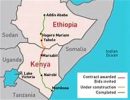Economic integration is a game-changing reality and African countries must fully embrace it to achieve sustainable inclusive development and reduce multidimensional poverty especially among women and youth.
Such is the main conclusion of the 2018 African Economic Conference (AEC) which concluded its 3-day annual gathering yesterday in Kigali, Rwanda.
The 2018 AEC brought together close to 400 participants including African researchers, government officials, policy-makers, civil society and private sector leaders in the first such gathering since the adoption of the African Continental Free Trade (AfCFTA) in March 2018, a single continental market for goods and services, with free movement of business persons and investments.
Addressing the conference’s last plenary session, Ayodele Odusola, Chief Economist UNDP Arica, said: “Integration should be a means not an end. We need to make sure that it is people driven and inclusive.”
“Regional and Continental Integration for Africa’s Development” is the theme of this year’s conference jointly organized by the United Nations Development Programme, the United Nations Economic Commission for Africa and the African Development Bank.
During panel discussions and presentations, AEC participants underscored the need to address impediments to greater regional and continental integration such as weak infrastructure and connectivity networks; a mismatch between local consumption and production modes; the profusion of multilateral agreements at the detriment of homegrown agreements; the inadequate engagement of the African private sector; illicit capital flight and unnecessary policy regulations.
It was also noted that insisted that a greater level of integration could help African countries make their voices heard on the global stage and that AfCFTA framework could go a long way towards correcting the imbalance the powers during negotiation between regional trading blocs.
Ms. Moono Mupotola, Director of Regional Integration Department at the African Development Bank said: “Since there is political will, policy makers and implementers of the Africa Continental Free Trade Area (AfCFTA) should try to come up with a perfect situation to start implementing what our political leaders have agreed to,” she said.
Adam Elhiraika, Director of ECA’s Macroeconomics and Governance Division called on African countries to meet their commitments on AfCFTA signing and ratification. “We all know the benefits of facilitating free movement of goods, services and people when we open our borders and integrate. Africa’s GDP would increase as high as 6% every year,” he said. “We need to make sure that our leaders’ commitment and vision to form African Continental Free Trade is realized and implemented. One single continental market for goods and services means wealth and prosperity for all Africans.”
To date, 44 African countries have signed the landmark African Continental Free Trade agreement. 12 out of the required 22 countries ratified it. The deadline for ratification is March 2019.
Highlights of the conference included the launches of the 2018 African Sustainable Report of the African Governance Report 2018, and the presentation of the Visa Open Index which measures 2018, which rates the openness of travel visa policy on the continent.
The three-day conference saw the award of two best research papers. The best award went to research paper titled: “Regional Integration: Do intra-African trade and Migration improve income in Africa?” authored by Blaise Gnimassoun, of the University of Lorraine, France.
The second best award went to research paper titled: “The Economic Diplomacy in Africa: The Impact of Regional Integration versus Bilateral Diplomacy on Bilateral Trade” authored by Sylvanus Kwaku Afesorgbor, of the University of Guelph in Ontario, Canada.’
The 14th African Economic Conference is scheduled to take place in December 2019.

